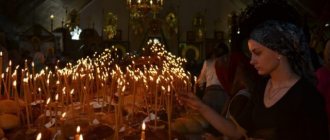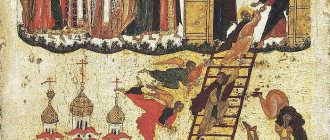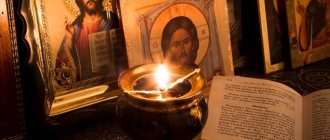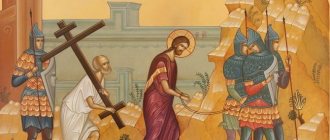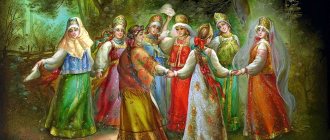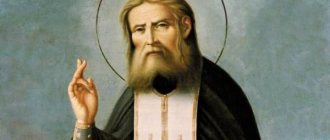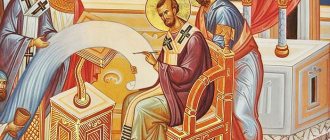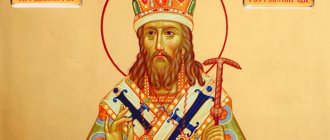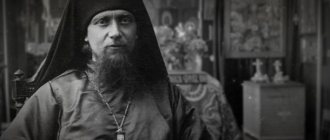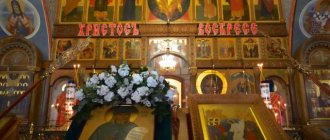ON SATURDAY EVENING
The paraecclesiarch slandered, and having gathered in the vestibule, I blessed the priest and said: Christ is risen: three times. And the usual 9th hour is tripsalm, like every day.
And we say the Sunday troparion, tone 8.
Thou hast descended from the heights, O Blessed Mother, / Thou hast accepted the burial of the third day, / that we may free our passions, / Our Life and Resurrection, Lord, glory to Thee!
And the kontakion, the same voice:
Even though you descended into the grave, O Immortal One, / but you destroyed the power of hell, / and you rose again as a conqueror, Christ God, / telling the myrrh-bearing women: Rejoice, / and Your apostle grant peace, / grant resurrection to the fallen.
Holiday traditions:
Fomino Sunday is called not only Anti-Easter, but also “Red Hill”. This popular name is due to the fact that after winter and a long fast, festivities began, and the first to dry out were the hillocks, where young people gathered. Starting from this day, the Sacrament of Wedding was resumed in churches, and therefore there were many weddings on Krasnaya Gorka and the next week. In the first centuries of Christianity, on this day, neophytes (recently baptized Christians) changed their festive white clothes, which they wore for the whole week after their baptism. Nowadays, on this day, brides wear wedding dresses and, more often, white dresses.
Read more about weddings in our materials:
• The sacrament of marriage and obstacles to it
• Rules for weddings in the Orthodox Church
ON MALAY VESPERS
Having blessed the priest, we say: Christ is risen: three times. Also psalm: Bless the Lord my soul:
I cried to the Lord: stichera on 4. Tone 1. Similar to: Heavenly ranks:
Christ endures humanely and touch, / as the Cross before this, / and unjust murder, / rose from the grave for three days, / do not destroy the seal, / and to the closed doors, / presenting the disciple as all things linen [Twice.]
Fomino’s unbelief, / the world-saving God-man Word, / even from the hellish hells the uprising assures, / the ulcers of the hands and feet more boldly touched / to the assurance of the world, / with the right hand of the inquisitive.
Gathered by fear from Your passion, the Apostle, the Word, / and the closed doors, / You suddenly descended in the midst of them, bestowing peace, / and reaching out to Thomas to touch / the honest side of Your ulcers.
Glory, and now, voice 2: After Thy rising, O Lord, / Thy disciples gathered together and the gates shut, / Thou didst stand in the midst, giving them peace. / And Thomas, too, was convinced by the vision of Thy hand and side, / of the Lord and God of Thy confession, / who trusteth in Thee for salvation, O Lover of mankind.
Quiet light: Prokeimenon: The Lord reigns:
On the stichera there are stichera, tone 2. Similar to: The House of Euphraths:
With pure lips / sing with the angels of men / of Him who rose three days ago from the grave, / and created the world.
Verse: Praise the Lord in Jerusalem, praise your God in Zion.
Thou hast appeared to Thy saints, O Saviour, as an apostle, / as a closed door, / thereby renewing to us / Thy Divine Spirit.
Verse: Strengthen the faith of your gates, and bless your sons in you.
Now You, the All-Tsar, / have not seen with your own eyes, / but with heartfelt love, / have believed in God, / we magnify in song.
Glory, and now, the voice is similar to the same:
Grant, O Deliverer, / peace to Thy people, / and resolution of debts, / through the prayers of the All-Pure One / and the one and only Mother of God.
Also: Now let go: Trisagion. According to Our Father:
Troparion, tone 7:
The sealed tomb, / The life from the tomb shone forth, O Christ God, / and through the closed door, / You appeared as a disciple, / the Resurrection of all, / thereby renewing the right spirit to us, / according to Your greatness, you are dear awn.
It is appropriate to edify: If there is no vigil during the Week: on Saturday evening at Compline for the Trisagion Kontakion of the Triodion of the holiday: Glory, and now: Easter: Even to the grave: And to the grave: We say this even before the giving of Easter.
Features of Orthodox worship
Today, May 9, a thanksgiving prayer service for the victory in the Great Patriotic War is being held in all churches and a special memorial service is being held for the fallen soldiers.
On Thomas Week, services are performed in the usual manner and the reading of psalms is resumed.
Of the Easter hymns, only the troparion “Christ is risen from the dead...” sounds. On Sunday, special hymns are heard dedicated to the second week after Easter and the assurance of the Apostle Thomas. The service contains texts glorifying the arrival of spring: “Today is spring for souls...”, “Today is spring fragrant...”.
At the Liturgy there are special festive antiphons. And although this holiday is not designated as great in liturgical textbooks, according to the liturgical features, Thomas Sunday looks like the Lord's holiday, that is, dedicated to the Lord Jesus Christ.
AT THE GREAT VESPERS
Always bless the priest, Christ is risen: three times. And aby we sing the opening psalm: Bless my soul the Lord: with singing, as is the custom: And after this is fulfilled, we verse: Blessed is the man: Kathisma 1st all. The Lord cried: we sing in the voice of 1, let’s set up verses, 10. And we sing the stichera of self-accordance, the new Weeks.
Tone 1. John the monk:
Through the closed door, / to the disciples gathered, / you suddenly entered the omnipotent Jesus our God, / and standing in the midst of them, / you gave peace, you filled them with the Holy Spirit, / you commanded them to wait, / and not to separate from Jerusalem, / until they are clothed from on high by force. / Moreover, we cry to Thee: / enlightenment and resurrection and our world, glory to Thee. [Twice.]
After the days of Your rise, O Lord, / You appeared as Your disciple / in the place where you had gathered, / and shouted to them: Peace be with you, / You showed your hand to the unbelieving disciple, / and your most pure rib. . / He believed and cried to You: / My Lord and my God, glory to You. [Twice.]
Thomas, the so-called Twin, was not with them, / when you entered, O Christ, by the closed door, / and also did not believe what was said to him, / from unbelief, teaching faith. / Thou didst not disdain, O Good One, / to show him Thy most pure side, / and the hand and foot of the ulcer. / He touched and saw, / confessed that You were not naked, / and not a simple Man, and cried out: / My Lord and my God, glory to You. [Twice.]
As a disciple to those who doubted, / on that day the Savior appeared, where He gathered Himself, / and having given peace, He cried out to Thomas: / Come, O Apostle, / touch your hand, in the bottom of the nail you plunge. / O good unbelief of Fomin, / bringing the faithful hearts into knowledge, / and crying out in fear: / My Lord and my God, glory to Thee. [Twice.]
Voice 2:
After Your rise, O Lord, / You became Your gathered disciple and the closed door, / You stood in the midst, giving them peace. / And Thomas also believed with the sight of Thy hand and side, / Confessed the Lord and God to Thee, / Who trusted in Thee for salvation, O Lover of mankind. [One time.]
To the prisoners, / presenting Jesus as a disciple, / giving fearlessness and peace, / also said to Thomas: / Why do you not believe me, because I have risen from the dead? / Bring your hand to this, / and place it in My side, and see. / For I do not believe in you, / all the skill of passion and my resurrection call with you: / My Lord and my God, glory to you. [One time.]
Glory, and now, voice 6. John the monk:
Through the closed doors, / you came, O Christ, to be a disciple, / then Thomas will be careful not to be with them. / The verb is: I have no faith, / unless I see the Lord. / I will see a rib, from which blood, water, and baptism come out. / I will see the ulcer, from which the great scab of man will be healed. / I will see that you are not like spirit, but flesh and bones. / Defeating death and reassuring Thomas, / Lord, glory to Thee.
Entrance. Quiet light: Prokeimenon of the day: The Lord reigns:
There are stichera at the lithium. Voice 4:
Lord, by the unbearable brilliance of Your Divinity, / You came to the imprisoned beings through the door, / and stood in the midst of the disciples. / You exposed your rib, / and you wounded Your hand and foot, revealing scabs, / but resolving sorrow and grief, / You clearly proclaimed: / In the same way you see in Me, O friends, the flesh is accepted, / Do not give up Ha I wear nature. / To the doubting disciple, / you commanded to touch with trepidation, saying: / having experienced everything, come, do not doubt the rest. / He felt with his hand Your deep being, / with fear he cried out faithfully, with faith: / My Lord and my God, glory to You.
Voice 8: Touch Thomas’s side with your hand, says Christ, / and come and touch the images of the nails, / test by faith and be faithful to Me, / and do not be unfaithful. / As Thomas touched the Lord with his finger, the great one cried out: / You are my God and Lord, O Compassionate One, glory to Thee.
Glory, and now, tone 8. Anatolia:
At the door of the prisoners, / to the disciples gathered, / the Savior appeared, where he had gathered them, / and standing in the midst of them, he said to Thomas: / come, touch and see the images of nails, / stretch out your hand and touch my side ́, / and do not be unfaithful, but preach by faith , / even from the dead is My Resurrection.
On the poem, the stichera are self-consonant, tone 4:
O glorious miracle! / Lack of faith in the well-known faith. / Thomas said: If I don’t see, I don’t have faith. / Having touched the ribs, he theologized the one who had become incarnate, / He also knew the Son of God, / as having suffered in the flesh, / the preaching of the resurrected God, / and cried out with a bright voice: / My Lord and my God, is sweet wa to you.
Verse: Praise the Lord, Jerusalem, praise your God, O Zion.
O glorious miracle! / The hay that touched the fire was saved / because Thomas placed the hand / of Jesus Christ God into the fiery ribs, / was not burned by the touch. / For our souls to turn from malice to piety, / cry out warmly from the depths of our souls: / Master, You are my God, / Risen from the dead, glory to You.
Verse: Strengthen the faith of your gates, and bless your sons in you.
O glorious miracle! / John in Persia reclined the Word, / Thomas was vouchsafed to touch the ribs, / but he was afraid of drowning / theology was a deep insight, / he was vouchsafed to teach us the secrets. / Presents the evidence clearly / of His rise, crying: / My Lord and my God, glory to Thee.
Glory even now, voice 5: Lover of mankind, the greatness and unconditional multitude of Your bounties, / for You are long-suffering, we are deafened by the Jews, / we are touched by the Apostles, / and we are greatly tested by those who reject You, / as Who were you incarnate? / How were you crucified, O sinless one? / But we understand, like Thomas, to cry out to You: / My Lord and my God, glory to You.
Also: Now let go: Trisagion. And according to Our Father:
Troparion of the holiday, tone 7, three times:
The sealed tomb, / The life from the tomb shone forth, O Christ God, / and through the closed door, / You appeared as a disciple, / the Resurrection of all, / thereby renewing the right spirit to us, / according to Your greatness, you are dear awn.
And the blessing of the loaves. And the reading of the Acts of the Saints by the Apostle. The Acts are revered from the beginning: or the conversations of Chrysostom from the beginning.
[If there is no vigil, according to Now you let go: and according to Our Father: Troparion: The tomb is sealed: And let go. In the morning we sing the Sunday Midnight Office, and on it we sing the Trinity canon, Octoechos of the 1st tone, sung after the Midnight Office. According to the canon, it is worthy to eat: Trinity. And so on. Trisagion. According to Our Father: Troparion: The tomb is sealed: Lord have mercy. 40. Glory even now: The most honest cherub: Verse: God has been generous to us: And prayer: Almighty and life-giving: And let go.]
Apostolic reading:
Acts of the Apostles, chapter 5, verses 12 - 20
Bishop Feoktist (Igumnov) comments
It is dear to all employees of “Thomas” that the memory of our patron saint - the Apostle Thomas - is celebrated by the entire Church on the next Sunday after Easter. We remember how in 1996 the first black and white issue of the Foma magazine was published. When choosing the title, the editors wanted to draw the attention of readers to the paradox - after all, Thomas does not take his word for it because he really wants to know the Truth with all his being. And Christ, probably, appears to the doubting disciple because he knows his thirst for faith.
We congratulate our readers on the week of the Apostle Thomas and wish you a good Sunday in church!
AT MORNING
At the end of the reading, we say the sixth psalm. And after the fulfillment of these great litanies. and God the Lord: we sing in a voice 7.
Troparion of the holiday, tone 7, three times:
The sealed tomb, / The life from the tomb shone forth, O Christ God, / and through the closed door, / You appeared as a disciple, / the Resurrection of all, / thereby renewing the right spirit to us, / according to Your greatness, you are dear awn.
According to the 1st verse of the sedal, tone 1. It is like: A stone is sealed:
For the sake of the Jews, a hidden disciple, / and those gathered in Zion, / you entered into them, O Good One, / and you stood in the midst of them, a closed door, / creating joy, and showed them your hand, / and your most pure ones x edge of the ulcer, / verb to the unbelieving disciple: / Bring your hand and test, / that I myself am, for your sake, I have suffered.
Glory, and now: the same. And holiday reading.
According to the 2nd verse, sedalene, voice 1. Similar to: Thy Sepulcher of the Savior:
You appeared to the belly, / by the closed door, Christ, the disciple, / and showed your ribs, and to your hand, and to your nose, / even from the grave, foretelling your rising, / but Thomas will not find, however Verb: / Unless I see Him, I will not believe with your words.
Glory, and now: the same. And holiday reading.
Greatness
We magnify You, life-giving Christ, / for our sake, who descended into hell / and raised everything with You.
Selected Psalm
1 The face of the Lord reigns, He is clothed in beauty. 2 The Lord clothed himself with strength and girded himself. 1 For establish the world, which cannot move. 2 Whoever proclaims the power of the Lord will all His praise be heard? 1 Let the Lord confess His mercies and His wonders to the sons of man. 2 And He brought them out of darkness and the shadow of death. 1 Thou shalt break in pieces the gates of brass, and break the chains of iron. 2 And I delivered them from their corruptions, and tore their bonds in pieces. 1 Because the poor Lord heard. 2 And thou shalt not despise thy own bound ones. 1 Arise as the Lord sleepeth, and smite his enemies. 2 For the eyes of the Lord are upon those who trust in His mercy. 1 Hear the groaning of the chained. 2 Give permission to the sons of those who were killed. 1 Let God rise again, and let His enemies be scattered, and let them flee from before His presence. 2 This day which the Lord has made, let us rejoice and be glad on it. 1 Arise, O Lord my God, may Your hand be exalted; do not forget Your poor to the end. 2 Lord my God, we will confess to You forever.
Also polyeleos. And sedal, voice 1. Similar to: Thy Sepulcher of Savior:
Seeing My ribs and the wounds of the nails, Thomas, / why do you not believe My Resurrection? / The Lord, as he says, has risen from the grave, / appearing as an apostle beyond words. / The twin believed and cried out to the Creator: / Thou art my God and Lord.
Glory, and now: the same. And the holiday reading:
Therefore, sedate, 1st antiphon of the 4th tone:
From my youth / many passions have fought me, / but intercede for me yourself, / and save me, my Savior.
You who hate Zion, / be put to shame by the Lord, / like grass for fire, / you will be withered.
Glory: By the Holy Spirit / every soul is alive, / and is exalted in purity, / is illuminated by the Trinity in sacred mystery.
And now, the same.
Prokeimenon, tone 4:
Praise the Lord, Jerusalem, / Praise your God, O Zion. Verse: Strengthen the faith of your gates.
Also another prokeimenon: Let every breath / praise the Lord. Verse: Praise God in His saints, praise Him in strengthening His power.
Gospel of Matthew, conception 116, Sunday morning, 1. [Matt. 28, 16 – 20.]
At that time, ten disciples went to Galilee, to the mountain, as Jesus commanded them. And when she saw Him, she worshiped Him, but she began to doubt. And Jesus came and spoke to them, saying: All authority in heaven and on earth has been given to Me. Go and teach all the languages, baptizing them in the name of the Father and the Son and the Holy Spirit, teaching them to observe all the commandments given to you. And lo, I am with you all the days, to the end of the age. Amen.
We also say:
Having seen the Resurrection of Christ, / let us worship the Holy Lord Jesus, / the only sinless one. / We worship Your Cross, O Christ, / and we sing and glorify Your holy Resurrection. / For You are our God, / Do we know You no other, / We call Your name. / Come, all you faithful, / let us adore the Holy Resurrection of Christ: / behold, through the Cross joy has come to the whole world. / Always blessing the Lord, / we sing His Resurrection: / having endured crucifixion, / destroy death by death. [Thrice.]
Psalm 50. And kissing the Gospel.
Glory: Through the prayers of the apostles, / Mercifully, cleanse / our many sins.
And now: Through the prayers of the Mother of God, / Most merciful, cleanse / our many sins.
Also, voice 6: Have mercy on me, O God, / according to your great mercy / and according to the multitude of your compassions / cleanse my iniquity.
Therefore, the stichera: Jesus has risen from the grave, / as he prophesied, / to give us eternal life / and great mercy.
Also, God save Thy people: And the abiye canon of the holiday, the creation of John the monk. Tone 1. Irmos twice, troparia on 12. From today we begin to say: Let us sing to the Lord: throughout Pentecost.
Song 1.
Irmos: Let us reap all the people, / from the bitter work of the pharaohs of Israel who betrayed them, / and in the depths of the seas with their wet feet we taught them, / a song of victory, as if they were glorified.
Today is spring for our souls, / Christ has risen from the grave like the sun, having risen on the third day, / driving away the dark storm of our sin. / Let us sing to you because you have become famous.
The Queen of the Times, on the luminous day, / the days she most clearly bestows upon the king, / adorns the chosen people of the church, / constantly girding the risen Christ.
The gates of death, Christ, / below the seal of the grave, below the keys of the doors, are opposed to You, / but you have risen and appeared as Your friend, Master, / granting peace, all understanding prevails.
Catavasia, both faces together: Resurrection day, / let us be enlightened, people. / Easter, the Lord's Easter, / from death to life, / and from earth to heaven, / Christ God has led us, / singing in victory.
Song 3.
Irmos: Establish me, O Christ, / on the immovable rock of Your commandments, / and enlighten me with the light of Your face, / for none is more holy than You, O Lover of Mankind.
New instead of old, / instead of corruptible, incorruptible, / By Thy Cross, O Christ, having perfected us, / in the renewal of life, Thou hast commanded us to live worthily.
Imprisoned in the tomb by Thy flesh, / indescribable, O Christ, Thou hast risen, / imprisoned by the door, / Thou hast appeared as Thy disciple, O All-Powerful One.
Your plagues, O Christ, / which you willingly endured for us, / having preserved as your disciple, have shown you / your testimony of your glorious Resurrection.
Katavasia: Come, let us drink new beer, / not from the barren stone of the miraculous, / but the source of incorruption / from the tomb of the one who waited on Christ, / in Him we are established.
Ipakoi, voice 6:
For in the midst of your disciples you came, O Savior, giving them peace, / come to us and save us.
And reading in the Theologian, its beginning: To be honored with renewal:
Song 4.
Irmos: The great mystery of Thy vision, O Christ, / seeing this from above, Habakkuk divinely foresaw, / came forth, crying unto Thee, / for the salvation of Thy people, O Lover of mankind.
Taste the bile, healing the ancient food, / now with a hundred honey, Christ gives enlightenment to the forefather, / and His sweet communion.
Rejoicing, we are being tested, / moreover, O Lover of mankind, you commanded Thomas to do this, / stretching out the ribs of the unbeliever, / peaceably assuring Your, O Christ, three-day rising.
Wealth drawn / from the treasure of the unstealthy Divine, Benefactor, / with a copy of Your perforated rib, / wisdom and intelligence fills the world of the Twin.
Your all-blessed tongue boasts, O Twin! / The first one piously preaches / the Giver of Life Jesus, God and Lord, / be filled with grace from the touch.
Katavasia: On the Divine guard / God-speaking Habakkuk / may he stand with us and show / the luminous Angel / clearly saying: / today is salvation for the world, / as Christ is risen, / as he is omnipotent.
Song 5.
Irmos: From the night we sing in the morning Thee, Christ, / Co-existent with the Father, and the Savior of our souls, / Grant peace to the world, O Lover of mankind.
Having presented the Savior to another who mourns, / by coming he takes away all sorrow, / and lifts up the joy of His Resurrection.
O truly praised Thomas of terrible undertaking! / Boldly touching the ribs, / Shining with divine fire.
Fomino’s unbelief, the parent of faith, you showed us, / for you, with all your wisdom, / provide for profit, O Christ, as a Lover of mankind.
Katavasia: Let us morning the deep morning, / and instead of peace we will bring a song to the Master, / and Christ we will see / the Sun of truth, / life shining for all.
Song 6.
Irmos: You saved the Prophet from the whale, O Lover of mankind, / and bring me up from the depths of sins, I pray.
You did not abandon Thomas, O Master, / immersed in the depths of unbelief, / stretched out your hand to the test.
Our Savior said: / Having touched Me, you see the bones bearing flesh, / I have not changed.
Thomas felt the ribs and knew with faith, / who was not at Your first entrance, our Savior.
Katavasia: You descended into the underworld of the earth, / and you crushed the eternal faiths, / containing the bound ones, Christ, / and the third day, like Jonah from the whale, / you rose from the grave.
Kontakion, tone 8:
With your curious right hand / your life-giving ribs Thomas tested, O Christ God, / as you entered through a closed door, / with the rest the apostles cried out to you: / You are the Lord and my God.
Ikos: Who will save the disciple’s hand then from burning, / when he approaches the fiery side of the Lord? / Who will give her the boldness, and perhaps touch / the fiery bone, everything intangible? / What if the rib had not given strength to the mortal right hand, / how can we touch, / shaken by suffering both above and below? / This grace was given to Thomas, even if he could touch it, / And Christ cried out: Thou art my Lord and my God.
Synaxarion.
Song 7.
Irmos: The image of serving the musical concord of convening people, / from the songs of Zion the fatherly youths of David sang, / tormentingly ruined the evil command, / and turning the flame into dew, dog chanting: / exalted Father and our God, blessed art thou.
As the first of days and this lordly light-bringer, / it is worthy to rejoice at the worthy new and divine people with trepidation: / the image brings forth the image of the ages, / as the osmite accomplishing the future, / exalted from Tsev and our God, blessed art thou.
The only daring one, with unfaithful faith / who has blessed us, Thomas the Twin, / will decide the gloomy ignorance of all ends, with faithful unbelief, / weaving a crown for himself without saying a word. / Thou art the exalted Lord, the Fathers and our God, blessed art thou.
Thomas did not doubt in vain about Your rise, and did not bow down, / but he was careful to demonstrate this, O Christ, with all his tongue. / Having convinced them with unbelief, teach everyone to say: / Thou art the exalted Lord, blessed art thou, the Fathers and our God.
With fear, Thomas placed his hand in Your side, O Christ, life-giving, / tremblingly felt the action, O Savior, the true / two natures in You, united without fusion, / and crying out by faith, O Lord Lya: / Thou art the exalted Lord, the Fathers and our God, blessed art thou.
Katavasia: Delivering the youths from the furnace, / having become a Man, / suffers as if he were mortal, / and with mortal passion, / will clothe in incorruption beauty, / One is blessed / of the Fathers and glorified.
Song 8.
Irmos: In the flame of a fiery burning furnace preserve your children, / and in the eye of the angel who descended to them, / sing to the Lord and exalt Him forever.
Desired Your joyful vision, / Thomas did not believe before: / Be worthy of the same God and Lord You are called, Master, / Whom we extol to all ages.
Having endured Fomino’s unbelief and showing his ribs, / who was touched by his hand, / sing to the Lord and exalt Him to all ages.
Your inconvenient treasure, hidden from the open to us, Thomas: / having praised God with a God-bearing tongue, / sing to the Lord, the verb, / and exalt Him to all ages.
Katavasia: This is the appointed and holy day, / One Saturday is King and Lord, / a holiday of holidays, / and triumph is triumphs, / and let us bless Christ forever.
On the 9th song, the most honest: we don’t sing: but every face is irmos.
Song 9.
Irmos: To you, the bright light and Mother of God, / we magnify the wonderful glory that is above all creatures, / with songs.
Thy bright day and most luminous, Christ, all-bright grace, / venerable with kindness, Thy disciple appeared, / we magnify in songs.
You, touched in the ribs by a mortal hand, / and not scorched by this, by the fire of an immaterial Divine being, / we magnify in songs.
You, like God, who resurrected Christ from the tomb, / did not see You with your own eyes, but believed with heartfelt love, / We magnify You with songs.
Katavasia: Shine, shine, / new Jerusalem, / for the glory of the Lord / shines upon you. / Rejoice now / and be glad, O Zion. / You, Pure One, rejoice, O Mother of God, / about the rise of Your Nativity.
And bow. Also, Holy is the Lord our God: on tone 1, three times.
Exapostilary, tone 1. Similar to: The sky with stars:
Having experienced my wounds with your hand, / do not disbelieve Me, Thomas, / for your wounded sake, / be of the same mind with your disciples, / and preach the living God. [Twice.]
Glory, even now: Today spring is fragrant, / and the new creation rejoices. / Today the keys of the doors are taken, / and Thomas’s unbelief is crying out: / My Lord and God.
On the praises of the stichera, on 4, tone 1. Similar to: Praises of the martyr:
According to Thy terrible rise from Thy grave, O Life-Giver, / as Thou didst not destroy the seals of the tombs, O Christ, / so Thou enteredst through the closed door to Thy glorious apostles, / bringing joy them, and give Your Right Spirit to them, / for Your immeasurable mercy.
Thomas and the Twin did not come when You appeared as a disciple, Lord. / Moreover, I do not believe in Your Resurrection, / and to those who saw You crying: / unless I put a finger into His side and nails of the wound, / I do not believe that He has risen to eat.
Touch as you wish, Christ cried out to Thomas: / put your hand and know Me, who have bones and earthly body, / and do not be unfaithful, just as be confident in others. / And he cried: / Thou art my God and Lord, / Glory to Thy rising.
Glory, voice 6: After the days of Thy rise, O Jesus the King, / the only begotten of the Word of the Father, / appeared to Thy disciple, imprisoned by the door, / gave Thy peace, / and showed signs to the unbelieving disciple thou art: / come and touch your hand and nose, and be imperishable My ribs. / But he believed and cried out to You: / My Lord and my God, glory to You.
And now, voice 2: Blessed are you:
The doxology is great. And the troparion of the holiday. Litany, and dismissal. The litias, that is, the procession into the vestibule, begin today. Likewise the catechumens of our venerable father Theodore the Studite, in which we sing:
Glory, and now, Gospel stichera, tone 1:
As disciples going to the mountain for the earthly Ascension, / the Lord appeared and worshiped Him, / and the given authorities learned everywhere, / I was sent into the heavenly places, / to preach the Resurrection even from the dead, / and the hedgehog's ascension to heaven. / In whom Christ God promised to endure forever, / and the Savior of our souls.
Hearken, as before the first hour there are litias in the vestibule and announcements of Studites. And hour 1. And other usual things. And a complete vacation.
Be aware that we sing in Compline for the succession of the saints who happened during all the Sundays of Holy Pentecost.
Liturgy comes at the time of labor for the sake of vigil. The hours of trippsalm are sung according to the Rule in the vestibule, and on them we say the troparion and kontakion of the holiday.
Be aware that from New Week until the celebration of Easter, the beginning of the Liturgy happens:
According to the hedgehog saying to the deacon: Bless the master: And to the priest: Blessed is the Kingdom: The priest sings: Christ is risen: three times, the entire troparion except for the verses: May God rise again: The same, litany, and other Liturgies. Instead, it is worthy: we sing: The angel cries with more grace: The same irmos, voice 1: Shine, shine: When the priest says: With the fear of God: And we: Blessed is he who comes in the name of the Lord, God the Lord has appeared to us. Priest: God save your people: And we, instead of the troparion: We see the true light: we sing: Christ is risen: once: and until the giving of Easter. There are other Liturgies according to custom. In his departure he always says: Glory to Thee, Christ God, our hope, glory to Thee. And we: Christ is risen: three times. Also the dismissal of the Liturgy according to custom.
Troparion for the Sunday of Antipascha, tone 7The sealed tomb, / the belly of the tomb shone forth, O Christ God, / and the closed door, / appeared as a disciple, / the resurrection of all: / renewing the right spirit for us, / according to your great mercy.
Translated from Greek “that which is instead of Easter”, the 2nd week (i.e. Sunday) after the week of Easter. Other names: New Week, Fomina Week. One of the earliest uses of the term “Antipascha” in the meaning of the week following the week (Sunday) of Easter is contained in the canonical rules attributed to Patriarch John the Faster of Constantinople.
Contents of the holiday
The most ancient sources mention the day of Antipascha, linking it, on the one hand, with the Resurrection of Christ, since from the 4th century. it served as the end of the 8-day Easter celebrations, on the other hand, with the sacrament of Baptism, since on this day or the day before, neophytes baptized on Easter or Holy Saturday took off their white baptismal vestments. The ancient Latin name for the day of Antipascha is associated with this custom - Dominica in Albis. Blzh. Augustine of Hippo († 430) in a word dedicated to the “octave of Easter” (i.e. Antipascha), says: “Today’s joy ends the Easter celebrations, because today the clothes of the neophytes are changed, but in such a way that the whiteness added to the clothes is forever remains in the heart."
The most important basis for combining Antipascha with Easter is the Gospel of John, chapter 20, 19-31, read on this day (at least since the 4th century) in both Eastern and Western rites. This gospel narrative connects two appearances of the Risen Savior to the apostles: on “the first day of the week in the evening” (Art. 19), that is, on the very day of the Resurrection, when the Lord Jesus Christ showed them His wounds, sent them to preach and, giving them the gift The Holy Spirit, gave them the power to forgive and forbear sins, ... and “after eight days” (Art. 26), when the Savior, having appeared to the disciples for the second time, with a call to touch His wounds, assured the Apostle Thomas (he did not see the first appearance of the Risen Christ and refused to believe stories of the other apostles), and he immediately confessed his faith in the God-manhood of the Risen Christ, exclaiming: “My Lord and my God!”
The interpretation of this Gospel is devoted to the “Word for the New Week,” attributed to St. John Chrysostom, one of the statutory readings for the holiday of Antipascha, according to the Byzantine Typicons. The repeated appearance of the Lord Jesus Christ to the disciples is explained here by the need for the assurance of the Apostle Thomas, whose “unbelief” (in this case, the desire for reliable knowledge confirmed by experience) is justified and even praised, for its result was the confession of Saint Thomas.
The Church also devotes this day to reflection on the renewal of all creation through the Resurrection of Christ, as stated in the word of St. Gregory the Theologian († 390) “On the New Week,” which in the Byzantine Typicons became one of the main statutory readings of the holiday. According to St. Gregory, just like the first creation (the creation of the world), which began on a weekly day (Sunday), so the new world, renewed by the Resurrection of Christ, begins on a weekly day. This day, the 8th after Easter, is celebrated as the Day of Renewal, because unlike the day of Easter, the very day of salvation, which is “the border between burial and Resurrection,” this day is the day of “remembrance of salvation,” the day “ pure new birth." The content of the celebration for everyone, its offering to God, should be an internal renewal: “Renew yourself, throw away the ancient man... only for the sake of remembering the ancient in order to avoid it.” The usual spring renewal of nature, coinciding with Antipascha, therefore takes on a new meaning as a visible manifestation and evidence of the internal renewal of all creation: “The Queen of the Seasons marches triumphantly in honor of the Queen of Days and presents her with gifts from all that is most beautiful and joyful.” The greatness of the holiday is emphasized by the agreement of the renewal of the visible and invisible world, which precedes the future “new heaven and new earth” (Rev 21. 1): “Now is earthly spring, spiritual spring, spring for souls, spring for bodies, visible spring, invisible spring; Oh, that we would take part in it there, having been wonderfully changed here, and renewed, crossed over to newness of life in Christ Jesus our Lord!”
In colloquial Russian, Antipascha is often called “Red Hill”, because it is the first day after the multi-day Great Lent and Easter, when the Sacrament of Marriage is allowed to be performed.
Article from volume II of the Orthodox Encyclopedia, Moscow. 2001
Some features of worship
Bright Week ends with St. Thomas' Resurrection, which is, as it were, a replacement (repetition) of Easter Day itself, which is why it is also called Antipascha (translated from Greek - “instead of Easter”).
The service of this day is devoted mainly to the remembrance of the appearances of Christ after the Resurrection to the Apostles, including Thomas. The entire service encourages believers to awaken from the sleep of sin, turn to the Sun of Truth - Christ, strengthen their faith and, together with the Apostle Thomas, sincerely and joyfully exclaim: “My Lord and my God.”
On Saturday evening before 9 o'clock the royal gates are closed. The 9th hour reads the usual three-psalm. On it is the Sunday troparion in the 8th tone: From on high you came down and the kontakion of Easter: Even into the grave.
On Antipascha Week, Sunday hymns from the Octoechos are not sung; the entire service will be performed according to the Colored Triodion.
Starting from St. Thomas Sunday, the verses of the Psalms, polyeleos and other sequences are resumed at services. The usual structure of the all-night vigil, hours, and Liturgy is restored (with the exception of some features).
From this day until Easter is celebrated, at all services that begin with the exclamation of the priest, and also before the start of the Six Psalms, Christ is Risen is sung or read three times.
Apostle Thomas (Comm. April 18/May 1, 2011 - remembrance of the assurance of the Apostle Thomas).
Saint Thomas the Apostle was from the Galilean city of Pansada and was engaged in fishing. Having heard the gospel of Jesus Christ, he left everything and followed Him. Apostle Thomas is one of the Twelve holy apostles, 12 disciples of the Savior.
According to the testimony of the Holy Scriptures, the holy apostle did not believe the stories of the other disciples about the Resurrection of Jesus Christ: “Unless I see the mark of the nails in His hand, and put my finger into the marks of the nails, and put my hand into His side, I have no faith” (John. 20, 25). On the eighth day after the Resurrection, the Lord appeared to the Apostle Thomas and showed His wounds. “My Lord and my God!” - exclaimed the holy apostle (John 20:28). “Thomas, who was once weaker than the other apostles in the faith,” says St. John Chrysostom, “by the grace of God became more courageous, zealous and tireless than all of them, so that he went around with his preaching almost the entire earth, not being afraid to proclaim the Word of God to the savage peoples.”
According to Church Tradition, Saint Thomas the Apostle founded Christian Churches in Palestine, Mesopotamia, Parthia, Ethiopia and India. The apostle sealed the preaching of the Gospel with martyrdom.
For the conversion to Christ of the son and wife of the ruler of the Indian city of Meliapora (Melipura), the holy apostle was imprisoned, endured torture, and finally, pierced with five spears, went to the Lord. Parts of the relics of St. Thomas the Apostle are found in India, Hungary and Mount Athos. The Arabian (or Arapet) icon of the Mother of God (September 6) is associated with the name of the Apostle Thomas.
Troparion, tone 2
Having been a disciple of Christ,/ a participant in the Divine Council of the Apostles,/ having known the Resurrection of Christ through unbelief,/ and having assured Him of His most pure passion by touch,/ Thomas is all-valid,// and now ask us for peace and great mercy.
Kontakion, tone 4
Filled with the wisdom of grace, / Christ’s apostle / and true servant / crying out to You in repentance // You are my God and Lord.
AT THE LITURGY
We begin the figurative one, and sing in the blessed ones, from the canon of the holiday, hymns 3 and 6.
Upon entering the troparion, tone 7:
The sealed tomb, / The life from the tomb shone forth, O Christ God, / and through the closed door, / You appeared as a disciple, / the Resurrection of all, / thereby renewing the right spirit to us, / according to Your greatness, you are dear awn.
Glory, and now: kontakion, tone 8:
With your curious right hand / your life-giving ribs Thomas tested, O Christ God, / as you entered through a closed door, / with the rest the apostles cried out to you: / You are the Lord and my God.
Prokeimenon of the Apostle, tone 3:
Great is our Lord, and great is His strength, / and His understanding is without number. Verse: Praise the Lord, for he is good. Psalm: May praise be sweet to our God.
Apostle in Acts, conception 14. [Acts. 5, 12 – 20.]
In those days, by the hands of the apostles there were many signs and wonders among the people: and they all sang with one accord in the porch of Solomon. From others, no one dares to cleave to them, but their people are great. Above all, the Lord’s believers are supplied with many husbands and wives. As if they were wearing the sick on hundreds of feet and laying them on their beds and on their beds, so that when Peter comes, his shadow will overshadow someone from them. And a multitude from the surrounding cities came to Jerusalem, bringing the sick and those afflicted by unclean spirits, and they were all healed. The bishop, and all those with him, the real heresy of the Sadducees, arose, and were filled with envy. And he laid his hands on the apostles and sent them out for the common observance. The angel of the Lord opened the door of the prison overnight, and brought them out, saying: Go and speak to the people in the church all the words of life.
Alleluia, tone 8: Come, let us rejoice in the Lord, let us shout to God our Savior. Verse: For God is a great Lord, and a great King throughout all the earth.
Gospel of John, conceived 65. [John. 20, 19 – 31.]
Late on that day, on the Sabbath, and with the door shut, where His disciples were gathered together, for the fear of the Jews, Jesus came and the hundred in the midst, and said unto them, Peace be unto you. And he said, showing them his hand and nose and ribs. The disciples rejoiced when they saw the Lord. Jesus said to them again: Peace be with you. As the Father sent Me, I send you too. And he said and breathed and said to them: Receive the Holy Spirit. If you forgive their sins, they will be forgiven them: and if you hold, they will hold. But Thomas, one of two, the so-called Twin, was not with them when Jesus came. To him, the friends of the disciples say: I have seen the Lord. And he said to them: If I do not see the marks of the nails in His hand, I will put my finger into the marks of the nails, and put my hand into His side, I do not have faith. And one day later he brought His disciples inside, and Thomas with them. Jesus came to the closed doors, and in the midst of them said: Peace be with you. Then the verb to Thomas: Bring your finger to this, and see My hand, and bring your hand, and put it in My side, and do not be unfaithful, but faithful. And Thomas answered and said to Him: My Lord and my God. Jesus said to him: Because you have seen Me, you have believed: you have not seen bliss and have believed. And Jesus did many and many other signs before His disciples, which are not written in these books. This is what was written, that you may believe that Jesus is the Christ, the Son of God, and that you who believe may live in His name.
Instead of Worthy: we sing:
The angel cried out with more grace: / Pure Virgin, rejoice! / And again I say: Rejoice! / Your Son is risen / three days from the grave, / and raised the dead: / people, rejoice.
Same irmos, voice 1: Shine, shine, / new Jerusalem, / for the glory of the Lord / shines upon you. / Rejoice now / and be glad, O Zion. / You, Pure One, rejoice, O Mother of God, / about the rise of Your Nativity.
